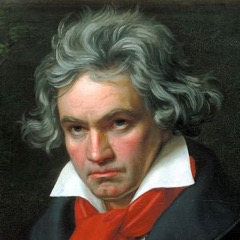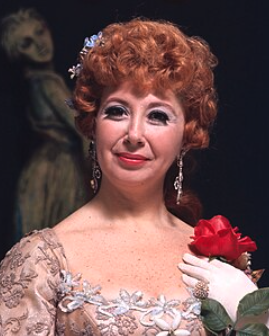Leonard Warren was born Leonard Warenoff in 1911 in New York. His parents were Russian Jewish immigrants. At age 24 he joined the chorus at Radio City Music Hall. 3 years later he entered the Metropolitan Opera Auditions of the Air and with his astounding voice was immediately given a contract. A recording contract with RCA soon followed. Although he sang all over the world including at La Scala and the Soviet Union, he sang more at the Met than anywhere else. He was often thought of as one of the greatest baritones of the Verdi repertoire, especially Rigoletto, which he sang with Toscanini in Madison Sq. Garden.
His last performance was in 1960 at the Met in a performance of La forza del destino. He had just finished singing the 3rd act aria which begins with the words “to die, a terrible thing.” He fell face down on the stage and immediately died of a massive cerebral hemorrhage. he was only 48.
The tenor, Joseph Schmidt was born in Ukraine in 1904. He was only 4′ 11″ and this made a stage career in opera impossible. However, he made many recordings, radio broadcasts and 9 movies. In 1942 he was interned in a Swiss refugee camp. He was in bad health and was treated for a throat infection in a hospital outside of Zurich. He had complained of chest pains but was discharged from the hospital and died 2 days later at age 38 from a heart attack.
Roberta Peters was born in 1930 in the Bronx as Roberta Peterman. The tenor, Jan Peerce recommended she study voice with William Herman, and at age 13 she dropped out of school and began having voice lessons 6 days a week, in addition to lessons in French, German and Italian. She was only 19 when she unexpectedly made her debut at the Metropolitan Opera, and sang there for 35 years.
She was a magnificent light coloratura soprano, and as a teenager, she carefully practiced technically very difficult passages using a book written for clarinet players. It paid off; her rapid scales were amazing! She was the most frequent guest to appear on the Ed Sullivan Show: 65 times!
In 1952 she married the baritone Robert Merrill and later explained that she had fallen in love with the voice and not the man. They divorced amicably, and continued to perform together. She died in January of 2017. She was 87.
Robert Merrill was born in Brooklyn in 1917 as Moishe Miller. His parents were Jewish immigrants from Warsaw, Poland. He paid for his singing lessons by working as a semi-professional pitcher and began singing at bar mitzvahs and weddings and at the Borscht Belt resorts in the Catskills and on the radio as a crooner. He then sang at Radio City Music Hall, and as a winner of the Metropolitan Opera Auditions of the Air in 1945, he immediately made his Met debut in La Traviata. Toscanini heard the broadcast and after auditioning him, engaged Merrill for the maestro’s last performance of La Traviata in 1946. Merrill was just 29. He later sang Verdi’s Un Ballo in Maschera with Toscanini.
After the untimely death of Leonard Warren in 1960 Merrill became the Met’s principal baritone. In fact he sang 769 performances there in 21 roles. He frequently performed the Star Spangled Banner at Yankee Stadium and Giants Stadium. Merrill died at home watching Game 1 of the 2004 World Series.
Beverly Sills was born in 1929 in Brooklyn as Belle Miriam Silverman. Her parents were Jewish immigrants from Ukraine and Romania. As a child she spoke Yiddish, Russian, Romanian, French and English. She began singing as a child, and after being repeatedly rejected by the NY City Opera, she was finally engaged by the company in 1955 singing Die Fledermaus. Her daughter was deaf and has multiple sclerosis and her son is severely mentally disabled.
Sills became quite famous beginning in 1966 when she sang and recorded Handel’s Julius Cesar with the NY City Opera. She appeared in all the major opera houses of the world, and was featured on the covers of Newsweek and Time magazines. She finally made her Met debut at age 46 in 1975. Sills helped to popularize opera by appearing on talk shows including with Johnny Carson, Dick Cavett, David Frost, Mike Douglas, Merv Griffin and Dinah Shore. She even appeared on the Muppet Show. After she retired from singing, she became the General Manager of the NY City Opera in 1980, the Chairperson of Lincoln Center in 1994, and the chairperson of the Met in 2002. Her charity work was devoted to the prevention and treatment of birth defects. Sills died at age 78 in 2007 from lung cancer.
Jan Peerce was born Joshua Pincus Perelmuth on the Lower East Side of Manhattan in 1904. His parents were immigrants from Belarus. He attended Columbia Univ. and was a professional violinist before his singing career, which started at Radio City Music Hall in 1932. Toscanini heard Peerce sing on the radio and after auditioning him, invited Peerce to sing with him and the NBC Symphony on 15 occasions beginning in 1938. Besides his musical style, Toscanini admired Peerce’s Italian diction and sometimes asked the tenor to demonstrate at rehearsals to Italian members of the cast!
His Met debut was in 1941; he sang there for 26 years. Peerce was the 1st American to sing with the Bolshoi Opera in Moscow. In 1971 he made his Broadway debut in Fiddler on the Roof and continued singing until he was 78! Having experienced a stroke and pneumonia, Peerce died in 1984 at age 80.
Richard Tucker was born in Brooklyn as Rubin Ticker in 1913. His parents were from what is now Moldova and Ukraine. Tucker dropped out of high school in his 2nd year and became a runner on Wall Street, and as a cantorial student he sang at weddings and bar mitzvahs. While working in New York’s garment district, he sang as a part-time cantor in Passaic, New Jersey, then full-time in the Bronx, and starting in 1943 at the prestigious Brooklyn Jewish Center. He was married to Jan Peerce’s sister, Sara. In 1945 he made his Met debut and for the next 30 years was the leading American tenor. In 1949 Toscanini engaged Tucker to sing in the maestro’s last performance of Verdi’s Aida, a live telecast.
Tucker was only 62 when he died from a heart attack before a performance he was about to sing in Kalamazoo, Michigan in 1975. He is the only person whose funeral was held on the stage of the Met. And New York City designated the small park across the street from Lincoln Center as Richard Tucker Square. The Richard Tucker Music Foundation was established to assist young singers.
Here is a short video: https://youtu.be/anBx6pDpzjQ

